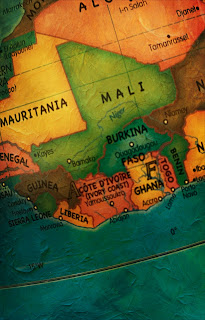READ
The
Fortunes of Wangrin, written by Amadou Hampaté Bâ and translated
by Aina Pavolini Taylor, tells the story of a hustler and a swindler. As a
child in French-controlled Mali in the late nineteenth century, Wangrin attends the so-called school for hostages, a French learning establishment where the
goal was to wean African children away from their culture so they would identify instead
with the French colonizers. Wangrin uses his education to become an interpreter
to the local French Commandant.
Wangrin is never content with his current circumstances, whatever they may be. He begins his career as a teacher, but when he discovers that being the Commandant’s interpreter is a better job, he schemes to take the job from the current interpreter. He then builds a network of informers, and finds ways to enrich himself and those closest to him. And so goes his career. He takes every opportunity to move up the ladder, without regard for anyone who may be harmed by his upward mobility. This tendency earns him some powerful enemies.
His conniving ways often result in legal difficulties for him, but he somehow manages to come through relatively unscathed. He’s also very superstitious, relying heavily on patron-gods, marabouts, geomancers, and other mystics and holy men to look into his future and advise him on how to proceed. Sometimes this works in his favor, and sometimes it doesn’t, especially if he doesn’t do exactly as he’s told.
The Fortunes of Wangrin is also a book about colonialism, and the uneasy relationship between the colonizers and the colonized. When Wangrin first begins working as a teacher, the French Commandant tells him that “… it is our mission to bring happiness to the Black peoples, if need be against their own wishes.” Apparently they mean to do that by substituting the French way of doing things for the Malian way of doing things. Being the trickster that he is, Wangrin is usually able to find a way around the French administrators, although he is not always trusted.
The author, who also attended the school for hostages, based the character of Wangrin on a man he met when he was a child. He used many of the stories told to him by that man to form the basis for this book. As a historian and a folklorist, Bâ was uniquely qualified to turn these oral stories into written literature.
The Fortunes of Wangrin occupies an important role in African literature, both for its portrayal of French colonization and its respect for oral literature. As Bâ himself was fond of saying, “Whenever an old man dies, it is as though a library were burning down.” With The Fortunes of Wangrin, he managed to preserve one such library after an old man’s death.
COOK
The
Fortunes of Wangrin didn’t
provide me with any inspiration for a Malian culinary creation, so I did an
Internet search to see what I could find. There were a few options, but I
decided to try the one that sounded most unusual and unlike anything else I’ve
cooked for this blog: plantain
and coconut stew. The recipe was on the Together Women Rise website, and it
was attributed to The Soul of a
New Cuisine: A Discovery of the Foods and Flavors of Africa, by Marcus
Samuelson. The ingredient list didn’t mention chilies, but the instructions
did, so I included one chopped jalapeño pepper.
Gotta say, this wasn’t one of my better culinary efforts. I’m not used to cooking with plantains, for starters, and the vinegar in the stew made it a little too sour. Maybe it will taste better tomorrow, after the flavors have melded, but I’m not holding out much hope.
GIVE
Mali is approximately two-thirds desert, and climate change has resulted in both extreme floods and devastating droughts. This makes it difficult for families to grow food, since they are never sure what the weather will bring, and some crops that grew well previously may not produce as much food now.
Climate change is especially hard on Malian women. According to Foune Coulibaly Wadidie, Minister for Advancement of Women, Children and Family of Mali, women “make up half of the country’s population of 20 million and contribute between 60 to 80 per cent of its food resources. However, climate change severely affects agricultural and related sectors, and economic constraints stemming from cultural norms mean that women’s livelihoods are dependent on the climate.”
I searched the projects at GlobalGiving to see if I could find one that might address this issue. I found a project organized by AGILE-International that would drill two wells for 186 women farmers in Mali. According to the description, this project provides “income-generation opportunities through agriculture, allows rural women to gain access to education, achieve economic autonomy, feed and shelter their families. AGILE will train women to drill wells, maintain them, and manage water resources.” More information about this project is available at: Drill 2 wells for 186 women farmers in Mali - GlobalGiving.
NEXT STOP: MALTA



No comments:
Post a Comment